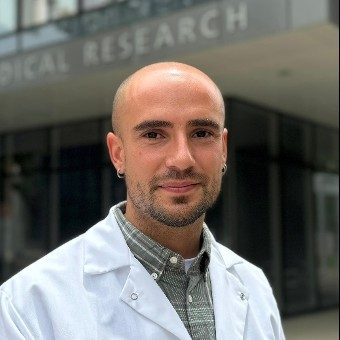Marcos Fernandez Fondevila, PhD

Hans Popper Memorial Postdoctoral Research Fellowship Award
$25,000 over one year
University of California San Diego
Deciphering the role of intestinal senescence in alcohol-associated liver disease: from characterization to therapy and mechanism
Mentor: Bernd Schnabl, MD
Alcohol intake is responsible for about 6% of all deaths worldwide and alcohol-associated liver disease (ALD) is its most common manifestation in the liver. Chronic alcohol abuse leads to gut bacterial overgrowth, changes in the composition of the gut bacterial microbiota, and elevated levels of bacterial-derived products in blood and liver. A particular feature of the disease is gut barrier dysfunction, which allows these toxic bacterial products to move from the gut to the liver causing damage and disease progression. Several factors including the direct effect of ethanol alter gut barrier function, although the exact mechanism is not fully understood.
Our preliminary data show that epithelial cells, which are part of the gut barrier, undergo senescence in patients with ALD. This process includes the release of proteins with potential harmful effects to their surroundings known as senescence-associated secretory phenotype (SASP). We detected increased levels of SASP proteins in stool from patients with ALD and found that they were associated with higher mortality. In mice and cell cultures, we discovered that ethanol can trigger senescence, SASP proteins, and cell death; all these effects can be blocked when intestinal senescence is inhibited. Based on this data, we hypothesize that epithelial senescence in the gut results in gut barrier dysfunction, increased intestinal permeability, and progression of ALD. To test this hypothesis, we want to i) decipher how ethanol induces senescence in gut epithelial cells, ii) investigate whether the inhibition of senescence ameliorates the gut barrier and reduces disease progression, and iii) study the effect of SASP proteins in gut barrier dysfunction in ALD. By understanding and eventually blocking the damaging effects of gut senescence, we hope to find new ways to treat or prevent ALD, helping patients to manage their condition better and reducing the complications and mortality.